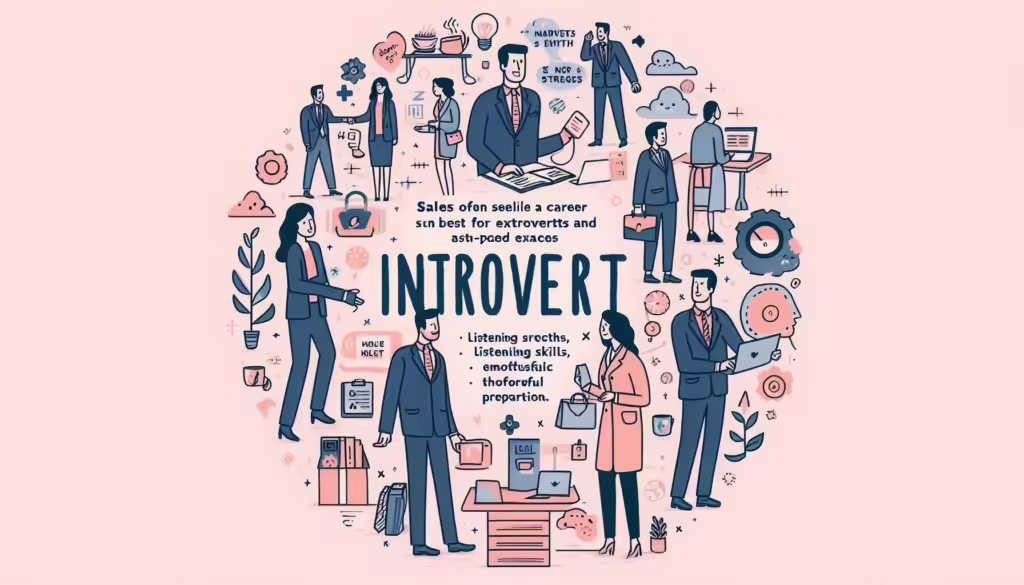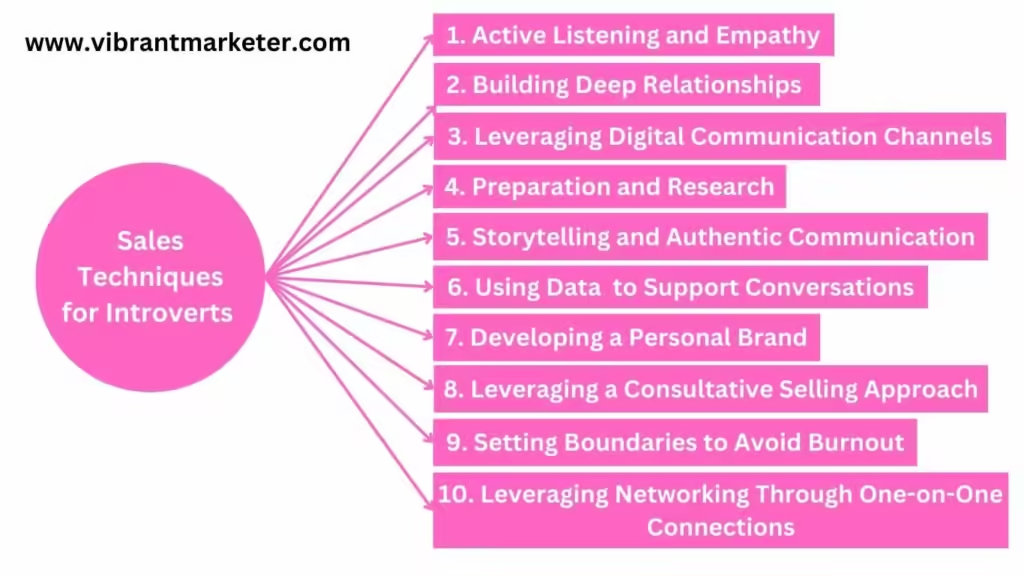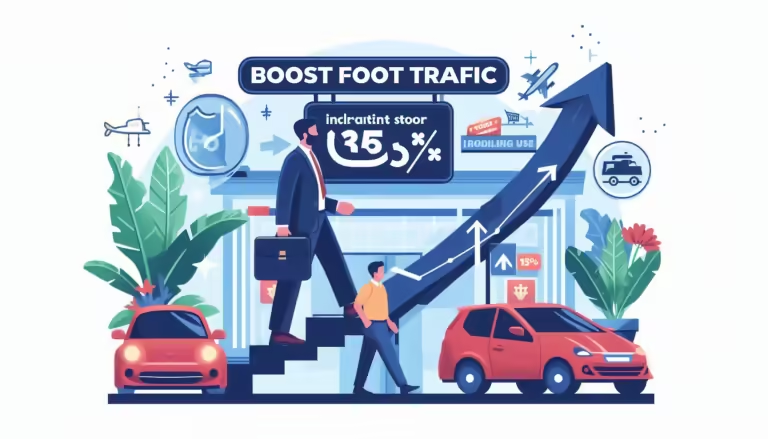Sales Techniques for Introverts (10 points to know)


1. Active Listening and Empathy
What it is:
Active listening involves giving full attention to what a customer is saying, understanding their needs, and responding thoughtfully. Empathy means putting yourself in the customer’s shoes to understand their feelings and motivations.
Why it’s important:
Introverts excel at listening and building genuine connections. Active listening helps build trust and shows customers that you truly care about their concerns. This can make customers more likely to open up, share challenges, and ultimately buy from you.
How to do it:
- Prepare Questions: Before a meeting, create a list of questions to better understand the customer’s needs.
- Paraphrase and Confirm: Restate what the customer says to show understanding.
- Focus on Their Words: Avoid distractions during conversations.
Example and Tips:
Suppose you are selling software solutions to small businesses. Instead of diving into product features, ask the business owner about their current challenges. Listen carefully and tailor your response accordingly.
Case Study:
Linda Rodriguez, a sales consultant at TechSolutions, doubled her sales by focusing on listening. She noticed that many competitors pushed products without understanding client needs. By practicing active listening, she identified hidden pain points, leading to more personalized solutions.
Expert Insight:
“Listening is actually not just only hearing; it’s connecting with their intention. By giving clients your full attention, you unlock doors others cannot.” —Michael Johnson, Sales Director at InsightCorp.
2. Building Deep Relationships Over Quick Connections
What it is:
Instead of focusing on quick sales or short interactions, introverts can build long-term relationships with customers based on trust, loyalty, and mutual respect.
Why it’s important:
Introverts often prefer deeper, meaningful connections, making them uniquely suited to nurture long-term client relationships.
How to do it:
- Follow Up Regularly: Send personalized messages, share articles, or provide helpful resources.
- Be Genuine: Show genuine interest in the customer’s personal and professional growth.
- Be Consistent: Stay in touch through periodic check-ins.
Example and Tips:
If you’re a real estate agent, instead of simply showing a property, invest time to understand a family’s dream home. Even if they don’t buy right away, keep in touch by sharing market updates and congratulatory notes on life events.
Case Study:
Rajesh Gupta, a finance sales manager, saw a 30% increase in repeat customers by prioritizing long-term connections. He followed up months after a sale, provided industry updates, and became a trusted advisor.
Expert Insight:
“Trust builds sales. Customers remember genuine care far longer than any one-off pitch.” —Priya Singh, Chief Customer Officer at ConnectBank.
3. Leveraging Digital Communication Channels
What it is:
Using tools like email, social media, and video conferencing to connect with clients rather than in-person meetings, which can be more draining for introverts.
Why it’s important:
Digital channels allow introverts to communicate effectively without the stress of face-to-face interactions. It provides more time to think, prepare responses, and share thoughtful content.
How to do it:
- Use Personalized Emails: Send customized messages instead of mass emails.
- Engage on Social Media: Share industry insights, comment on client posts, and message directly.
- Schedule Virtual Meetings: Host video calls with prepared talking points.
Example and Tips:
If you’re a B2B marketer, create tailored LinkedIn posts or videos addressing client pain points. Invite prospects to connect and engage privately.
Case Study:
Sarah Walker, a marketing specialist at TrendTech, found that using LinkedIn to connect with prospects saved her from anxiety-inducing cold calls. She scheduled short, personalized video calls, which led to a 40% conversion rate.
4. Preparation and Research
What it is:
Introverts often excel at thoroughly preparing for meetings, pitches, and calls. This involves researching clients, industries, and potential challenges beforehand.
Why it’s important:
Preparation builds confidence and helps introverts feel more comfortable. It ensures conversations are relevant and impactful, creating a strong first impression.
How to do it:
- Research Client Needs: Study their industry, competitors, and business goals.
- Create Custom Proposals: Prepare tailored solutions and pitches.
- Anticipate Questions: Think of potential questions and prepare answers.
Example and Tips:
Before meeting a potential client, research their company’s website, read recent news, and learn about competitors. Bring tailored insights to the meeting.
Case Study:
Daniel Chen, a sales consultant, always arrived at client meetings with customized data. This approach made him stand out from competitors, winning 70% of new accounts.
Expert Insight:
“Preparation gives introverts a superpower. Know your stuff and watch confidence rise.” —Angela Brown, VP of Sales at GrowthLeader.
5. Storytelling and Authentic Communication
What it is:
Using personal stories and authentic communication to build trust, illustrate value, and connect with customers.
Why it’s important:
Storytelling is a powerful way for introverts to share insights and create emotional connections. People remember stories better than facts alone, making sales more memorable.
How to do it:
- Share Customer Success Stories: Talk about real experiences that demonstrate value.
- Be Authentic: Don’t force high-pressure pitches. Speak naturally and honestly.
- Relate Stories to Client Needs: Make stories relevant to their situation.
Example and Tips:
If you’re selling productivity software, share a story about how it helped a company boost efficiency by 30%.
Case Study:
Alex Torres, a medical sales representative, increased sales by 20% by using relatable stories of patient outcomes, showing the impact of his products.
Expert Insight:
“Storytelling humanizes sales. Authentic stories resonate far more than memorized scripts.” —Emily White, CEO of HealthCare Solutions.
6. Using Data and Analytics to Support Conversations
What it is:
Providing data, charts, and reports to back up claims and demonstrate value.
Why it’s important:
Data-driven sales give credibility to introverts who prefer structured, evidence-based conversations. It helps answer customer concerns objectively.
How to do it:
- Use Case Studies: Present data-backed examples of past successes.
- Create Custom Reports: Show how your solution impacts their metrics.
- Highlight ROI (Return on Investment): Use numbers to demonstrate value.
Example and Tips:
Present a chart showing how your solution reduced costs for similar companies. Let data speak.
Case Study:
Jacob Lee, a software sales manager, used data analytics to highlight potential savings for prospects, increasing deal closure rates by 25%.
Expert Insight:
“Data is persuasive for logical buyers. Let facts do the talking.” —Steve Carter, Analytics Lead at DataEdge.
7. Developing a Personal Brand
What it is:
Personal branding involves creating a unique image of yourself as a professional that highlights your strengths, values, and expertise in sales. It’s how people perceive you within your industry.
Why it’s important:
Having a strong personal brand can establish trust and differentiate you from competitors. It helps introverts attract leads organically, reducing the need for aggressive self-promotion.
How to do it:
- Leverage LinkedIn: Share thoughtful posts, articles, and engage in discussions within your industry.
- Be Consistent: Develop a recognizable message or specialty that people associate with you.
- Showcase Expertise: Publish case studies, share success stories, and present at webinars.
Example and Tips:
Create a series of posts on LinkedIn sharing insights and trends from your sales field. Consistently engaging will position you as an expert in your area.
Case Study:
Melissa Harper, a technology consultant, built her reputation by sharing weekly updates on tech industry trends on LinkedIn. Within a year, she gained a following of 10,000 professionals, which led to new sales leads without cold outreach.
Expert Insight:
“Personal branding is your way of showing who you are authentically. For introverts, it’s an organic means of generating leads.” —James Bell, Branding Specialist at MarketVibe.
8. Leveraging a Consultative Selling Approach
What it is:
Consultative selling focuses on deeply understanding customer needs and providing tailored recommendations rather than pushing a product.
Why it’s important:
Introverts excel at deep analysis, asking the right questions, and uncovering client needs. This Approach can presented you as a trusted advisor rather than just a sales person.
How to do it:
- Ask Thoughtful Questions: Understand the client’s pain points and goals.
- Offer Tailored Solutions: Avoid a one-size-fits-all approach; instead, provide personalized recommendations.
- Be Patient and Non-Pushy: Focus on building trust and showcasing your expertise.
Example and Tips:
When selling a financial product, instead of pitching right away, ask about the customer’s goals, risk tolerance, and past investment experiences. Tailor your suggestions based on their answers.
Case Study:
Robert Matthews, a sales executive, adopted a consultative approach by spending more time on needs analysis meetings. His clients appreciated his thoughtful recommendations, resulting in a 50% increase in client retention rates.
Expert Insight:
“Clients don’t want generic solutions; they want someone who understands their needs inside-out.” —Patricia Green, VP of Sales at SolutionsFirst.
9. Setting Boundaries to Avoid Burnout
What it is:
Sales, especially for introverts, can be draining due to constant social interaction. Setting boundaries helps manage energy levels and maintain focus.
Why it’s important:
Introverts need time to recharge. Without boundaries, the stress of too many meetings, calls, and interactions can lead to burnout, impacting productivity and well-being.
How to do it:
- Schedule Breaks: Plan downtime between meetings to rest and reflect.
- Limit Unnecessary Meetings: Politely decline non-essential calls.
- Communicate Preferences: Let colleagues and clients know your preferred methods and times for communication.
Example and Tips:
Block out an hour each day to process client feedback and prepare for the next meeting. Use email communication for tasks that don’t require calls.
Case Study:
Jessica Liu, a software sales manager, set clear boundaries by blocking off “quiet hours” for focused work. Her productivity improved by 30%, and she reported higher job satisfaction.
Expert Insight:
“Sales is a marathon, not a sprint. Taking time for yourself is not a luxury; it’s essential.” —David Chen, Sales Coach and Author of Recharge for Results.
10. Leveraging Networking Through One-on-One Connections
What it is:
Instead of engaging in large social events, introverts can focus on building meaningful connections through one-on-one interactions.
Why it’s important:
Introverts often thrive in smaller settings where they can connect deeply with people. One-on-one interactions allow for more authentic conversations and personalized relationship building.
How to do it:
- Seek Coffee Chats: Opt for one-on-one coffee meetings over large conferences.
- Use Personalized Follow-Ups: Send personalized thank-you messages after meetings.
- Leverage Mutual Connections: Ask for introductions through mutual acquaintances.
Example and Tips:
If attending a conference, set up individual coffee chats with key people rather than trying to work the entire room.
Case Study:
Andrew Foster, a SaaS sales executive, focused on one-on-one networking at industry events. He secured more meaningful connections and closed deals worth $500,000 by nurturing these personal relationships.
Expert Insight:
“Deep connections happen in intimate settings. Take your time; great partnerships are worth it.” —Karen White, Networking Strategist at PeopleFirst.
Conclusion: Sales Techniques for Introverts
FAQs
Sales techniques for introverts focus on using listening skills, thoughtful planning, and personal strengths to build trust and sell effectively, without relying on aggressive tactics.
Introverts are great at building meaningful connections, listening carefully to customers, and providing thoughtful, personalized solutions. These strengths make them highly trustworthy and effective.
Introverts can focus on smaller, one-on-one conversations instead of big group events. Setting up coffee chats or virtual meetings makes it easier to connect without feeling overwhelmed.
Introverts can use social media to share thoughtful posts, connect with prospects through messages, and build their personal brand without needing to meet face-to-face.
Introverts can ask open-ended questions, listen carefully, and show genuine interest in their customers’ needs. Starting with questions about the customer’s goals or challenges works well.
Introverts can set boundaries, take regular breaks to recharge, and schedule time for focused work without interruptions. Saying “no” to non-essential meetings can also help.
Introverts can build confidence by practicing their pitch, preparing for meetings, focusing on their strengths, and celebrating small successes. Taking time to reflect and learn helps, too.
Yes, personal branding is great for introverts. Sharing expertise online, writing articles, and engaging on social media can attract leads without needing to “sell” all the time.
Share this post




Chiranjeev Jaiswal
Chiranjeev Jaiswal (M.B.A. and P.G.D.M.in Marketing from IM-BHU) launched "Vibrant Marketer" out of a deep passion for all things marketing. After years of working in the industry, he realized that marketing success isn’t about following the same playbook—it’s about staying ahead of the curve and thinking outside the box.












